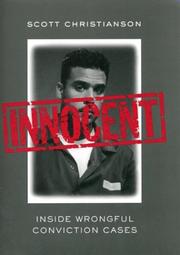| Listing 1 - 3 of 3 |
Sort by
|

ISBN: 0814790216 9780814790212 0814716342 9780814716342 Year: 2004 Publisher: New York, NY
Abstract | Keywords | Export | Availability | Bookmark
 Loading...
Loading...Choose an application
- Reference Manager
- EndNote
- RefWorks (Direct export to RefWorks)
Innocent graphically documents forty-two recent criminal cases to find evidence of shocking miscarriages of justice, especially in murder cases. Based upon interviews with more than 200 people and reviews of hundreds internal case files, court records, smoking-gun memoranda, and other documents, Scott Christianson gets inside the legal cases, revealing the mistakes, abuses, and underlying factors that led to miscarriages of justice, while also describing how determined prisoners, post-conviction attorneys, advocates, and journalists struggle against tremendous odds to try to win their exonerations.The result is a powerful work that recounts the human costs of a criminal justice system gone awry, and shows us how wrongful convictions can—and do—happen everywhere.
Prosecutorial misconduct --- Criminal justice, Administration of --- Judicial error --- Conviction of the innocent --- Convictions, Erroneous --- Convictions, Mistaken --- Convictions, Wrongful --- Criminal justice, Errors of --- Erroneous convictions --- Errors of criminal justice --- Innocent, Conviction of the --- Justice, Miscarriage of --- Miscarriage of justice --- Mistaken convictions --- Wrongful convictions --- Justice, Administration of --- Trials --- Misconduct, Prosecutorial --- Legal ethics --- blameless. --- blaming. --- consequences. --- journalist. --- prominent. --- reveals.
Book
ISBN: 128269765X 9786612697654 0520945611 9780520945616 9781282697652 9780520255623 0520255623 Year: 2010 Publisher: Berkeley, Calif. University of California Press
Abstract | Keywords | Export | Availability | Bookmark
 Loading...
Loading...Choose an application
- Reference Manager
- EndNote
- RefWorks (Direct export to RefWorks)
The Last Gasp takes us to the dark side of human history in the first full chronicle of the gas chamber in the United States. In page-turning detail, award-winning writer Scott Christianson tells a dreadful story that is full of surprising and provocative new findings. First constructed in Nevada in 1924, the gas chamber, a method of killing sealed off and removed from the sight and hearing of witnesses, was originally touted as a "humane" method of execution. Delving into science, war, industry, medicine, law, and politics, Christianson overturns this mythology for good. He exposes the sinister links between corporations looking for profit, the military, and the first uses of the gas chamber after World War I. He explores little-known connections between the gas chamber and the eugenics movement. Perhaps most controversially, he has unearthed new evidence about American and German collaboration in the production and lethal use of hydrogen cyanide and about Hitler's adoption of gas chamber technology developed in the United States. More than a book about the death penalty, this compelling history ultimately reveals much about America's values and power structures in the twentieth century.
Gas chambers --- Capital punishment --- History. --- History --- 1924. --- 20th century. --- america. --- american history. --- collaboration. --- controversial. --- dark. --- death penalty. --- eugenics movement. --- gas chamber technology. --- gas chamber. --- germany. --- hitler. --- human cruelty. --- human execution. --- human history. --- hydrogen cyanide. --- industry. --- law. --- lethal gas chambers. --- medicine. --- method of killing. --- military uses. --- modern history. --- nevada. --- no witnesses. --- out of sight. --- politics. --- power structures. --- profit. --- science. --- united states. --- war. --- world war i. --- wwi.
Book
ISBN: 1283028867 9786613028860 0252090845 9780252090844 9780252034398 0252034392 9780252076886 0252076885 9781283028868 661302886X Year: 2010 Publisher: Urbana
Abstract | Keywords | Export | Availability | Bookmark
 Loading...
Loading...Choose an application
- Reference Manager
- EndNote
- RefWorks (Direct export to RefWorks)
Fugitive slaves --- Enslaved persons --- Slavery --- Antislavery movements --- Underground Railroad. --- History --- Nalle, Charles, --- Tubman, Harriet, --- Troy (N.Y.) --- Slaves
| Listing 1 - 3 of 3 |
Sort by
|

 Search
Search Feedback
Feedback About UniCat
About UniCat  Help
Help News
News